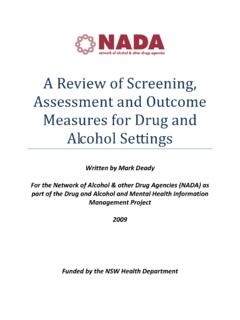Transcription of NCMHCE Sample Case Studies - NBCC
1 NCMHCE Sample Case StudyPart OneIntakeClient Age: 26 Sex: Male Gender: Male Sexuality: Heterosexual Ethnicity: White Relationship Status: Single Counseling Setting: Outpatient community counseling office Types of Counseling: Individual and Family Presenting Problem: Depression interfering with the quality of life Diagnosis: Major depressive disorder, Recurrent episode, Severe Presenting Problem: You were assigned to a 26-year-old, single, White client who presented for counseling due to suicidal thoughts and feeling extremely sad.
2 He reported that he was close to his mother, who died from cancer a little over two years ago. Last night, he confided to his roommates that he had researched suicide methods on the internet. His roommates accompanied him to his appointment and waited in the lobby. Two weeks ago, your client lost his job as a retail store clerk because he showed up late because of oversleeping. He reported that he completed many online job applications but currently had zero energy for the job search. He indicated that his roommates were paying household bills until he gets back on his feet.
3 He became tearful when saying he does not want to be a burden to his roommates. He said he knows suicide would cause his family and roommates great suffering and does not want to hurt them. A maternal uncle died by suicide when your client was young. He reported no access to guns or drugs he could use to overdose. He said he is rarely alone because he lives with four roommates. He disclosed that he does not want to die and hopes counseling will help him enjoy his life with friends and family Status: Your client appeared moderately disheveled.
4 His clothes were wrinkled. His nails and beard were unkempt. His depressed mood was congruent with his flat affect. He reported difficulty making decisions and a lack of interest in his future. He indicated that he no longer looks forward to playing video games. Although he once 2022 National Board for Certified Counselors, Inc. All rights reserved. Updated March 20221 CENTER FORCREDENTIALING&EDUCAT IONloved to read books, he hasn t read anything for months. In the past, he was known as a Potterhead for his love of the Harry Potter books.
5 Your client said that before his mother s death, he usually drank a couple of beers on weekends. Now he drinks a six-pack of beer most nights. There was no evidence of hallucinations or delusions. Your client indicated that he has had prior depressive episodes and is non-adherent to antidepressant medication. His primary care physician prescribed antidepressants after his mother died, but he stopped taking them. He revealed that in the past month he has been feeling down most days. He has been sleeping 10 12 hours per night, more than is typical for him.
6 Family History: Your client identified his roommates as his true family. He has been estranged from his father for two years. He stated his father is very demanding and bribes him with money to attend university. Your client said he has no interest in attending school. Your client s mother had periods of depression during your client s childhood. Your client is the youngest of three children and is on good terms with his siblings, but he rarely talks with them, as they live out of state. At the end of the intake session, your client agreed to talk with his primary care physician about resuming antidepressant medications.
7 1. What behavior disclosed during the mental status examination affirms your client s diagnosis? A. Your client chooses not to take prescribed antidepressant Your client experienced the death of someone they had a close relationship Your client appears disheveled and presents in unkempt clothing. D. Your client experiences hypersomnia every day or nearly every day of the week. 2. What in the intake leads you to affirm the severity of his diagnosis? A. Your client meets distress and manageability criteria.
8 B. Your client meets the suicide risk criteria. C. Your client meets episode recurrence criteria. D. Your client meets the risk and prognostic criteria. 3. What therapeutic metaphors would be useful in building rapport with your client? A. alluding to references from his previous readingsB. guided imagery you developed to help him relax and be mindful C. self-disclosure of your past battles with depression and loss D. references from the Diagnostic and Statistical Manual of Mental Disorders (DSM-5) 4.
9 What would prompt you to assess your client for a co-occurring disorder? A. Your client has adjustment issues due to a career problem. B. Your client s affect and disorganized thinking indicate a thought disorder. C. Your client s loss of an attachment figure places him at risk for bereavement. D. Your client has given up recreational activities because of substance use. 5. What is the long-term therapeutic goal for this client? A. reduction of depressive and suicidal symptoms B. improve social and occupational functioning C.
10 Explore trauma and bereavement issues D. reduction of alcohol and substance use 2022 National Board for Certified Counselors, Inc. All rights March 20222 Part TwoSecond session, two days after the initial intake: Your client arrived on time for his second session. He was mildly disheveled, wearing a wrinkled t-shirt and jeans. He made fair eye contact. He reported that he had resumed taking what is left of his medications and scheduled an appointment with his primary care physician. He indicated feeling tired, but a little less sad.










